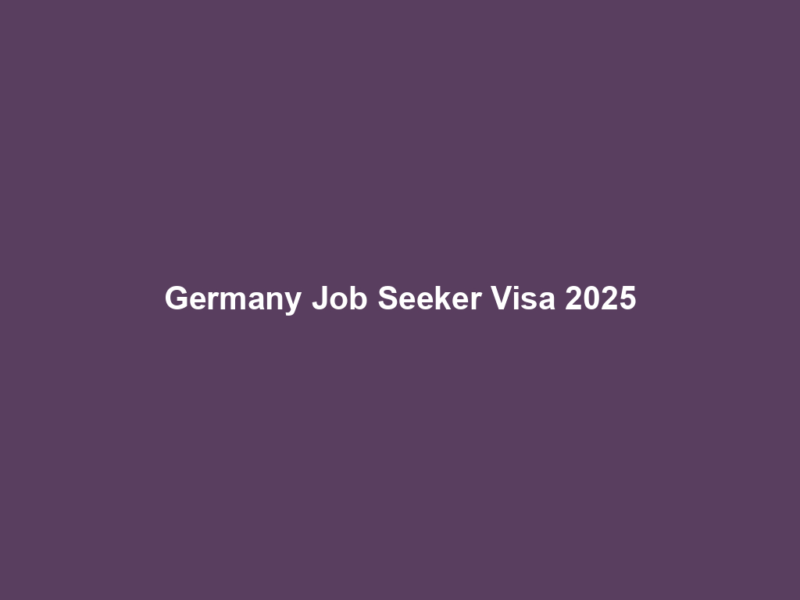If you’re looking to advance your career in Europe, the Germany Job Seeker Visa 2025 may be your gateway to high-paying jobs, professional growth, and a new life in one of the world’s most developed economies. This visa is designed to help qualified professionals from non-EU countries relocate to Germany and search for jobs onsite for up to six months.
Germany is facing a skilled labor shortage across various industries such as IT, engineering, healthcare, and manufacturing. This has created a wealth of job opportunities for international workers, especially those with technical backgrounds or professional qualifications. With the right strategy and preparation, securing a job and even visa sponsorship from a German employer is very achievable in 2025.
In this guide, we’ll walk you through everything you need to know about the Germany Job Seeker Visa 2025, including how to apply, the best industries hiring foreign talent, tips for landing a sponsorship job, and what it takes to eventually secure permanent residency (PR).
What is the Germany Job Seeker Visa?
The Germany Job Seeker Visa is a long-term residence permit that allows qualified non-EU citizens to enter Germany and stay for up to six months while they search for employment. Unlike traditional work visas that require a job offer upfront, this visa is designed for job seekers to explore work opportunities on the ground.
Key Features:
-
Valid for 6 months
-
No job offer required before applying
-
Requires proof of qualifications and financial means
-
Leads to work visa or EU Blue Card upon employment
-
Pathway to PR and citizenship after a few years
This visa is ideal for professionals in fields like IT, nursing, mechanical engineering, automotive tech, and skilled trades. It’s also useful for recent graduates with recognized university degrees seeking relocation options with long-term career potential.
Who Can Apply for the Germany Job Seeker Visa 2025?
To qualify for the Germany Job Seeker Visa in 2025, applicants must meet certain eligibility criteria:
-
Hold a recognized university degree or a vocational qualification equivalent to a German degree.
-
Have a minimum of 5 years of work experience in your field (less for recent graduates).
-
Proof of financial stability, usually around €947 per month (approx. €5,700 for 6 months) to cover living costs.
-
Valid health insurance that covers your stay in Germany.
-
Basic German language skills (A1 or A2 level) can be helpful but are not always mandatory.
-
No criminal record or visa overstay history.
Step-by-Step Application Process
Applying for the Germany Job Seeker Visa involves careful preparation and attention to documentation. Below are the standard steps:
1. Check Degree Recognition:
Visit Anabin Database to verify if your degree is recognized in Germany. If not listed, apply for an official equivalency certificate.
2. Gather Required Documents:
-
Valid passport
-
Passport-sized photos (biometric)
-
Degree certificate and transcripts (with translations)
-
Proof of work experience
-
Proof of financial means (blocked account or sponsor letter)
-
Proof of accommodation in Germany (hotel/Airbnb booking)
-
Health insurance coverage
-
Motivation letter explaining your job search plan
-
Updated CV in German format
3. Schedule an Appointment:
Book an appointment at the German embassy or consulate in your home country.
4. Attend Visa Interview:
During your interview, present all documents and demonstrate your intent to find a job and contribute to the German economy.
5. Wait for Approval:
Processing time varies but typically takes 4–12 weeks. You’ll be notified via email or phone.
Work Options and In-Demand Jobs in 2025
Germany’s economy in 2025 continues to offer high-demand job opportunities across sectors. According to the Federal Employment Agency, the following sectors are facing acute labor shortages:
-
IT and Software Development
-
Engineering (Mechanical, Civil, Automotive)
-
Healthcare (Nurses, Doctors, Caregivers)
-
Skilled Trades (Electricians, Plumbers, Carpenters)
-
Logistics and Warehouse Management
-
Hospitality and Tourism
-
Renewable Energy and Green Tech
Many of these jobs offer visa sponsorship and relocation assistance to attract international workers. Companies like Siemens, SAP, Bosch, and DHL are leading employers that frequently sponsor non-EU professionals.
To explore real-time job listings, visit Make It in Germany – Germany’s official government portal for foreign job seekers.
Visa Sponsorship and Permanent Residency (PR) Path
Once you land a job within the six-month visa period, your employer can help you transition into a work permit or EU Blue Card which offers even more benefits, such as higher salary thresholds and a fast-track path to PR.
Advantages of Visa Sponsorship:
-
Easier extension to long-term residence
-
Access to health, pension, and social benefits
-
Eligibility to bring family members
-
Clear route to permanent residency (after 33 months with Blue Card or 21 months with B1-level German)
Once you’ve held your employment visa for a few years, you can apply for permanent residency, and eventually German citizenship, especially if you integrate well and meet the language requirements.
Tips to Increase Your Chances of Success
-
Tailor your CV and cover letter to German standards (Lebenslauf format).
-
Learn basic German phrases for better networking and communication.
-
Use platforms like LinkedIn Germany, StepStone.de, Indeed Germany, and site.com/jobs (internal link) to apply before and during your stay.
-
Attend job fairs and networking events in cities like Berlin, Munich, or Frankfurt.
-
Consider internship or part-time roles as a foot in the door.
Cost Breakdown of Germany Job Seeker Visa
It’s important to budget accordingly when planning your journey. Below is an approximate breakdown of major expenses:
-
Visa application fee: €75
-
Health insurance for 6 months: €300–€500
-
Blocked account requirement: ~€5,700
-
Accommodation (monthly): €350–€700
-
Flight ticket: €300–€700 (depending on country)
-
Translation and document certification: €100–€200
Estimated total cost: €6,500 to €8,000
This investment is usually recovered within months after securing employment, especially in high-paying industries.
Relocation Tips for Job Seekers
Making a smooth transition to life in Germany involves more than just finding a job. Here are some relocation tips to help you settle faster:
-
Arrive in a major city like Berlin, Munich, Frankfurt, or Hamburg, where job opportunities are abundant.
-
Book temporary accommodation (Airbnb or hostel) for the first 2–4 weeks while you search for a long-term rental.
-
Open a German bank account and get a local SIM card within your first week.
-
Register your address (Anmeldung) at the local registration office within 14 days.
-
Join local expat communities via Meetup, Facebook groups, or Internations.org for networking and support.
Moving to Germany is not just about getting a job. You also have to prepare for your new life. When you arrive, it is best to go to a big city like Berlin, Munich, Frankfurt, or Hamburg. These cities have many jobs, and you will find more help there.
At first, you can stay in a short-term place like an Airbnb or a hostel. Stay there for two to four weeks while you look for a real house or apartment to rent. This gives you time to learn the area and find the best place for you.
Try to open a bank account in Germany in your first week. You will need it to get paid or pay for things. Also, get a German phone SIM card. This will help you make calls, use the internet, and stay connected with people.
Go to the local registration office and write down your new address. This is called Anmeldung. You must do this in your first 14 days. It is very important.
You can also make new friends by joining groups online. Look on Facebook, Meetup, or Internations.org. These groups help people from other countries talk, share tips, and feel at home.
Comparing Germany’s Job Seeker Visa to Other Countries
If you’re considering your options in 2025, here’s a quick comparison of Germany’s Job Seeker Visa with similar programs in other countries:
| Feature | Germany | Austria | Portugal | UAE (Job Seeker Visa) |
|---|---|---|---|---|
| Duration | 6 months | 6 months | 120 days | 60–120 days |
| Degree requirement | Yes | Yes | Yes | Yes |
| Job offer needed before | No | No | No | No |
| Financial proof needed | Yes (€5,700) | Yes (€1,200/month) | Yes (€3,040) | Yes (approx. AED 14,000) |
| PR Path | Yes | Yes | Yes | No |
| Language requirement | Low (English/German helpful) | Medium (German recommended) | Low (Portuguese optional) | None |
Germany’s visa offers the best pathway to permanent residency and long-term integration in the EU, especially for skilled professionals.
Common Mistakes to Avoid
-
Applying without checking degree recognition through Anabin.
-
Submitting incomplete documentation during embassy appointments.
-
Underestimating living costs or not opening a proper blocked account.
-
Arriving without any job leads – always start applying before you land in Germany.
-
Ignoring German language basics – even A1 proficiency can help you settle and network better.
Avoid these mistakes, and your journey to a successful career in Germany will be much smoother.
Final Thoughts: Why Germany is a Top Choice for 2025 Job Seekers
Germany continues to be one of the most immigrant-friendly countries for skilled professionals in 2025. With its aging population and rising demand for foreign talent, the Job Seeker Visa is your best bet for:
-
High-paying jobs with visa sponsorship
-
Relocation and PR opportunities
-
A stable, globally respected work environment
-
Access to the entire EU job market in the future
If you’re ready to take the next step, prepare your documents, start your job search today, and begin your journey to a better life and career in Germany. Let’s Get Started!

